七年级下册3单元考点知识
英语人教版七年级下册三单元a部分笔记
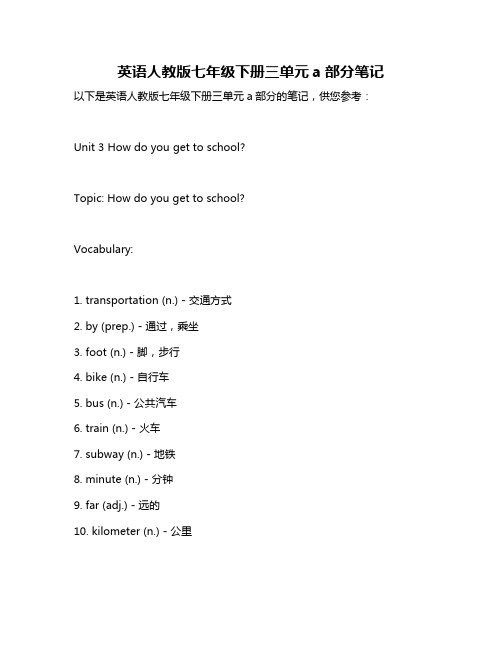
英语人教版七年级下册三单元a部分笔记以下是英语人教版七年级下册三单元a部分的笔记,供您参考:Unit 3 How do you get to school?Topic: How do you get to school?Vocabulary:1. transportation (n.) - 交通方式2. by (prep.) - 通过,乘坐3. foot (n.) - 脚,步行4. bike (n.) - 自行车5. bus (n.) - 公共汽车6. train (n.) - 火车7. subway (n.) - 地铁8. minute (n.) - 分钟9. far (adj.) - 远的10. kilometer (n.) - 公里Grammar:1. Present Simple Tense - 一般现在时态2. Prepositions of Method - 表示方式的介词(如by)3. Adverbs of Time - 时间状语(如every day, sometimes)4. Adverbs of Frequency - 频率状语(如usually, never)5. Adverbs of Degree - 程度状语(如very, a little)6. Adverbs of Place - 地点状语(如here, there)7. Adverbs of Manner - 方式状语(如slowly, quickly)8. Adverbs of Purpose - 目的状语(如to go to school, to buy a book)9. Adverbs of Condition - 条件状语(如if, unless)10. Adverbs of Time and Place - 时间地点状语(如when, where)Example Sentences:1. I get to school by bus every day. (我每天乘公交车去学校。
英语七年级下册Unit3-How do you get to school知识点
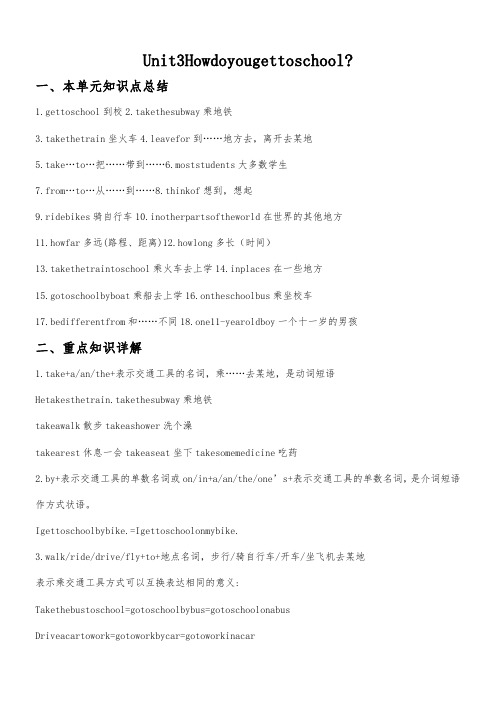
Unit3Howdoyougettoschool?一、本单元知识点总结1.gettoschool到校2.takethesubway乘地铁3.takethetrain坐火车4.leavefor到……地方去,离开去某地5.take…to…把……带到……6.moststudents大多数学生7.from…to…从……到……8.thinkof想到,想起9.ridebikes骑自行车10.inotherpartsoftheworld在世界的其他地方11.howfar多远(路程、距离)12.howlong多长(时间)13.takethetraintoschool乘火车去上学14.inplaces在一些地方15.gotoschoolbyboat乘船去上学16.ontheschoolbus乘坐校车17.bedifferentfrom和……不同18.one11-yearoldboy一个十一岁的男孩二、重点知识详解1.take+a/an/the+表示交通工具的名词,乘……去某地,是动词短语Hetakesthetrain.takethesubway乘地铁takeawalk散步takeashower洗个澡takearest休息一会takeaseat坐下takesomemedicine吃药2.by+表示交通工具的单数名词或on/in+a/an/the/one’s+表示交通工具的单数名词,是介词短语作方式状语。
Igettoschoolbybike.=Igettoschoolonmybike.3.walk/ride/drive/fly+to+地点名词,步行/骑自行车/开车/坐飞机去某地表示乘交通工具方式可以互换表达相同的意义:Takethebustoschool=gotoschoolbybus=gotoschoolonabusDriveacartowork=gotoworkbycar=gotoworkinacarFlytoshanghai=gotoshanghaibyplane/air=takethe/aplanetoshanghai=gotoshanghaiona/an/the plane.4.get表示“到达”,后接名词需加to,接地点副词不加to.reach给示到达,是及物动词,其后直接接宾语。
人教版七年级下册英语3单元知识点总结与练习题

一、词汇拓展(1)diver开车;驾驶→drivern司机;驾驶员(2)ride.骑,乘坐→ridern骑车或马的人(3)villagen.乡村;村镇→villagern.村民(5)quickadj.快的;迅速的→quicklyadv.快地;迅速地(6)cross.越过;横过acrosspron.横过;横穿crossingn十.字路口(7)trueadj.真实的→trulyadv.真实地二、短语(1)busstop公共汽车停车站(2)busstation公共汽车站(3)schoolday学校上课日;学校上班日(4)an11-year-oldboy一个十一岁大的孩子(5)getto到达同reach或arriveat/in (6)takeabus乘坐公共汽车(7)walktoschool步行去上学同gotoschoolonfoot(8)drivetowork开车去上班(9)takethesubway乘地铁(10)rideabike骑自行车(11)crossariveronaropeway(12)haveto不得不;必须同must(13)cometrue变为现实;实现(14)thinkof想起;认为同comeupwith(15)talktosb.跟某人谈话同speaktosh(16)between....and...介于⋯⋯.和⋯⋯之间、(17)bybus/subway乘坐公共汽车/地铁:(18)ontheschoolbus乘坐校车(19)inaplane乘坐飞机同byplane3(20)howlong多久;多长时间(21)howfar多远(22)from.....to从.⋯到...⋯.(23)whatabout...?.⋯⋯怎么样?.⋯呢.?(24)You,too.你也一样。
(25)I’mnotsure我.不确定三、知识点stop1)stop作动词,意为“停止,中断,阻止,阻拦”等意。
例如:Thecarstopped.车停了。
北师大版七年级下册英语unit3知识点总结 语法点(含答案)
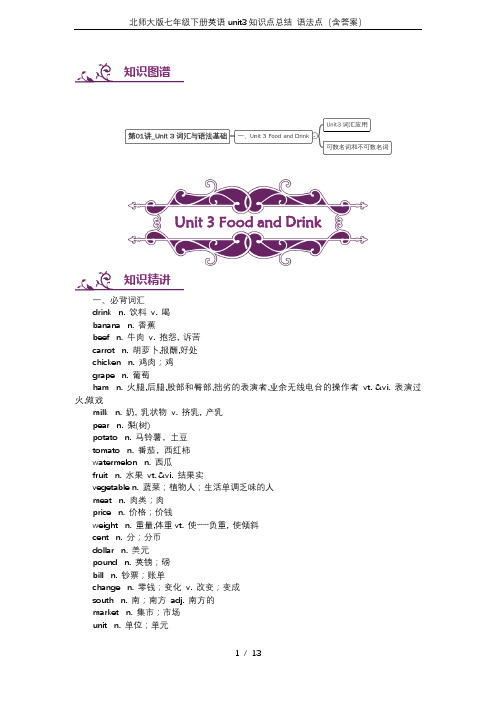
不可数名词可以表示数量的短语修饰。例如:a piece ofworka glass ofmilk
就不可数名词的量进行提问时,一般用How much...?
例如:---How muchwaterdo you have?
---Just a bottle.
对许多家长来说,要支付孩子学费双职薪水必不可少。
verb /kɒst/
If something costs an amount of money, you must pay that amount to buy or do it.
价钱为;需花费
1). ----How much does this book cost? ---It costs £25."
我不知道昨晚在酒吧怎么会花了这么多钱。
3). We spent a fortune when we were in New York.
我们在纽约花了一大笔钱。
3. cost noun /kɒst/
the amount of money needed to buy, do, or make something
许多学生每天喝两杯以上的含糖饮料。
5. I’ll take six. 我要拿6个。
一、考点
可数名词和不可数名词Countable and Uncountable Nouns
1. 英语中,名词分为可数名词和不可数名词。
可数名词指可用数目计数的名词。
可数名词一般有单数和复数两种形式。
可数名词作单数使用时,前面可以加冠词a或an。例如:ahouss- housesawatch- watches
【答案】D
人教七年级下册英语第三单元知识点
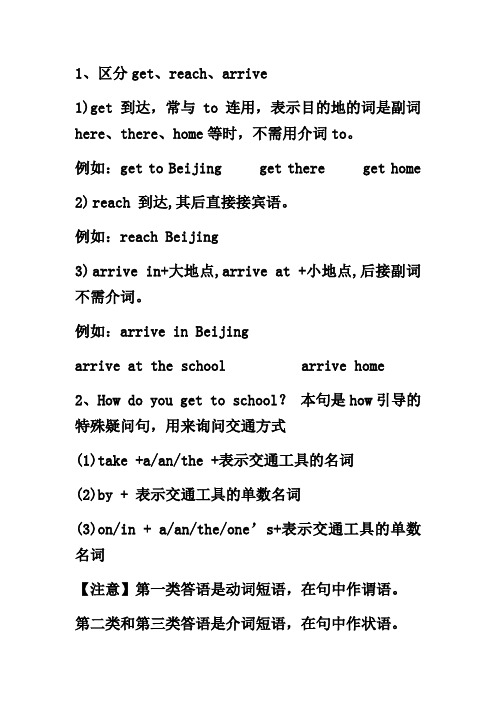
1、区分get、reach、arrive1)get 到达,常与to连用,表示目的地的词是副词here、there、home等时,不需用介词to。
例如:get to Beijing get there get home 2)reach 到达,其后直接接宾语。
例如:reach Beijing3)arrive in+大地点,arrive at +小地点,后接副词不需介词。
例如:arrive in Beijingarrive at the school arrive home2、How do you get to school?本句是how引导的特殊疑问句,用来询问交通方式(1)take +a/an/the +表示交通工具的名词(2)by + 表示交通工具的单数名词(3)on/in + a/an/the/one’s+表示交通工具的单数名词【注意】第一类答语是动词短语,在句中作谓语。
第二类和第三类答语是介词短语,在句中作状语。
by + 表示交通工具的单数名词时,名词前不能加冠词等修饰语。
(4)walk/ride/drive/fly+to+地点名词步行/骑自行车/开车/坐飞机去某地例如:1)I walk to school.=I get to school on foot.2)I ride my bike to school.=I get to school bybike.=I get to school on my bike.3)I take the bus to school.=I get to school bybus=I get to school on the bus.4)drive a car to work=go to work by car=go to workin a car5)fly to shanghai=go to shanghai byplane/air=take the/a plane to shanghai=go to shanghai on a/an/the plane.3、hundred数词,“一百”,当hundred前面有基数词修饰,表示确切数字时,hundred要用单数;当hundred前面没有基数词修饰,表示不确切数字时,要用hundreds of,意为“数百的,成百上千的”。
七年级下册英语第三单元知识点汇总
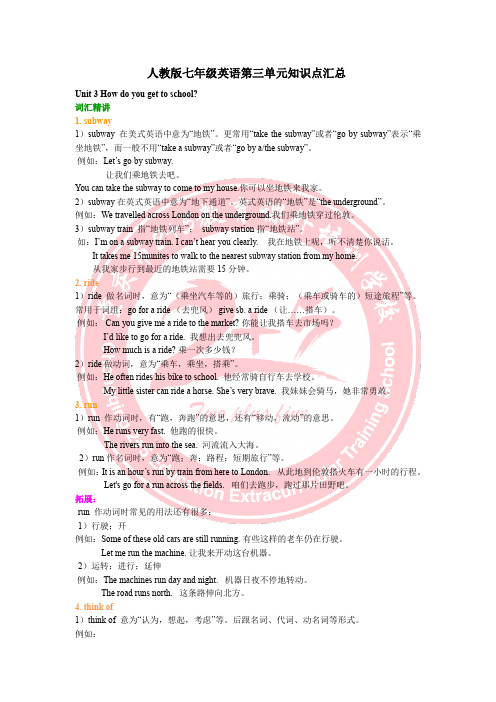
人教版七年级英语第三单元知识点汇总Unit3 How do you get to school?词汇精讲1. subway1)subway 在美式英语中意为“地铁”。
更常用“take the subway”或者“go by subway”表示“乘坐地铁”,而一般不用“take a subway”或者“go by a/the subway”。
例如:Let’s go by subway.让我们乘地铁去吧。
You can take the subway to come to my house.你可以坐地铁来我家。
2)subway在英式英语中意为“地下通道”。
英式英语的“地铁”是“the underground”。
例如:We travelled across London on the underground.我们乘地铁穿过伦敦。
3)subway train 指“地铁列车”;subway station指“地铁站”。
如:I’m on a subway train.I can’t hear you clearly. 我在地铁上呢,听不清楚你说话。
It takes me 15munites to walk to the nearest subway station from my home.从我家步行到最近的地铁站需要15分钟。
2. ride1)ride 做名词时,意为“(乘坐汽车等的)旅行;乘骑;(乘车或骑车的)短途旅程”等。
常用于词组:go for a ride(去兜风)give sb. a ride(让……搭车)。
例如:Can you give me a ride to the market?你能让我搭车去市场吗?I’d like to go for a ride. 我想出去兜兜风。
How much is a ride?乘一次多少钱?2)ride做动词,意为“乘车,乘坐,搭乘”。
例如:He often rides his bike to school. 他经常骑自行车去学校。
仁爱版七年级下册unit3知识点归纳

仁爱版七年级下册unit3知识点归纳仁爱版七年级下册unit3主要涉及到的学习内容为人教版七年
级下册unit8B(What’s the matter?)的基础上拓展,主要围绕着“身体部位”、“疾病症状”、“医疗保健”等方面展开。
下面我们将对这些知识点进行逐一归纳。
一、身体部位
在开始学习本单元之前,我们需要了解一下人体各个部位的名称。
包括头、脸、眼睛、耳朵、鼻子、嘴巴、脖子、肩膀、手臂、手、手指、胸部、背部、肚子、腰、臀部、腿、脚和脚趾等。
在
单元学习过程中,我们会了解到人体各个部位的常见问题以及如
何描述他们。
二、疾病症状
学习本单元的主要目的是了解一些常见的疾病和症状,并学习
如何描述它们。
比如感冒、发烧、头疼、咳嗽、流鼻涕、喉咙痛、肚子疼、身体疼痛、晕倒等。
在学习这些疾病和症状时,我们需
要了解它们的发生机制以及治疗方法,以便在需要的时候能够及时处理。
三、医疗保健
了解了身体部位和疾病症状之后,我们需要了解如何进行医疗保健。
这包括去看医生、吃药、休息和保持健康等。
在单元学习中,我们还将了解到使用医疗设备和用于保持健康的基本知识和技能,如如何使用医药包、如何使用体温计等。
总结
仁爱版七年级下册unit3主要涉及到人体的各个部位、常见疾病和症状以及如何保持健康等方面的知识。
学习这些知识的目的是让我们更好地理解人体的结构和功能,掌握基本的医疗保健知识,能够及时发现和处理身体不适的问题,并保持身体的健康。
七年级下册道德与法治第三单元知识点

七年级下册道德与法治第三单元知识点第三单元在集体中成长第六课“我”和“我们”1什么叫集体?集体的特征是什么?(1)集体的含义:集体是人们联合起来的有组织的整体。
一般来说,集体的联结度越高,个体感知到的集体温暖就越多。
(2)集体的特征:集体并不是成员的简单相加,而是有共同目标、分工明确的整体。
集体的力量来源于成员共同的目标和团结协作。
2.为什么我们需过集体生活?(1)在集体中,我们可以获得安全感和归属感。
(2)当集体取得成绩、受到表彰或奖励时,我们可以体验到集体荣誉感。
3.集体荣誉感的作用是什么?如何获得集体荣誉感?(1)作用:集体荣誉感令我们骄傲、自豪,给我们温暖和力量,激励我们不断前进。
(2)获得方式:集体荣誉是集体成员共同奋斗的结果,是我们共同的荣誉。
4.集体力量和个人力量的关系是什么(或为什么说集体的力量是强大的)?(1)个人的力量是分散的,但在集体中汇聚,就会变得强大。
(2)个人的力量是有限的,但通过优化组合可以实现优势互补,产生强大的合力。
(3)集体可以完成许多单凭一己之力无法完成的事情。
(4)集体的力量是强大的,在某种程度上可以影响甚至改变一个人。
5.集体对个人的影响具体表现在哪些方面?(1)个人在集体生活中会自觉或不自觉地产生与集体要求相一致的态度和行为。
(2)集体有助于我们获得安全感和自信心。
(3)集体有助于我们学习他人的经验,扩大视野,健康成长。
6.我们在集体中涵养品格的表现有哪些?(1)集体生活可以培养我们负责任的态度和能力。
在集体中,每个人有不同的角色,承担不同的职责;我们在认真做事的过程中体现自己的价值,体验责任感,做有担当的人。
(2)集体生活可以培养我们人际交往的基本态度和能力。
在集体中,每个人来自不同的家庭,有不同的生活经历和性格特点。
我们在交往中可以学会彼此接纳、尊重、理解和包容,学会友好相处。
7.在集体中负责任、做事情对个人成长有什么重要意义?有利于培养我们的责任感;有利于体现我们的自身价值;有利于我们在集体中锻炼自我,不断成长;等等。
- 1、下载文档前请自行甄别文档内容的完整性,平台不提供额外的编辑、内容补充、找答案等附加服务。
- 2、"仅部分预览"的文档,不可在线预览部分如存在完整性等问题,可反馈申请退款(可完整预览的文档不适用该条件!)。
- 3、如文档侵犯您的权益,请联系客服反馈,我们会尽快为您处理(人工客服工作时间:9:00-18:30)。
七年级下册考点知识集Unit 3考点归纳[考点1] hundred①There are _______ students in my school.②There are twenty _______ students in my school.③There are twenty _______ the students in my school.A. hundredB. hundredsC. hundred ofD. hundreds of[归纳]hundred前有_______时且直接修饰名词用________,如间接修饰名词用____________。
无具体的数字直接修饰名词用__________。
[考点2] how短语的提问①They walk to school.______ do they _____ to school?②My home is about five miles away.______ _______ is your home?③It takes me 15 minutes to get home._____ ______ ______ it _______ you to get home?④Changjiang River is about 6300 km.______ ______ is Changjiang River?⑤My shoes are $102.______ ______ ______ your shoes?⑥My brother is 13.______ ______ is your brother?⑦There are 20 boys in the room._____ ______ ______ there in the room?⑧She has some milk for breakfast._____ ______ milk ______ she _____ for breakfast?⑨His sister is well._____ ______ his sister?[归纳]对方式、身体状况提问用_________,对距离和长度提问用__________,对年龄提问用__________,对可数名词的数量提问用___________,对不可数名词的数量和价格提问用___________。
[考点3]live①They live _____ the second floor.②We live ______ our parents now.③My grandpa lives _____ be 92 years old.④We live _____ Chongqing.A. toB. inC. onD. with[归纳]live on是________,live in是_______,live to 是______,live with是_______。
[考点4] 乘车方式①他们走路上学。
They ________ to school.They ________ to school _____ ______.②我父亲坐5路公交车上班。
My father _____ to work _____ the number 5 bus.My father ______ the number 5 bus ______ work.[归纳] 介词短语:____ +交通工具,____ the /a /an +交通工具。
动词短语:______ the /a /an +交通工具二者间互换:go … _____交通工具= ______ the /a /an +交通工具…[考点5] 花费我每天用35分钟看书。
It ______ _____ 35 minutes _____ _____ books every day.= I ______ 35 minutes ______ books every day.[归纳] 某人做某事花费….的句句是:①___________ __________________ ②_________________________ [考点6] stopat the bus stop 词组中的stop是____词,意思是______。
We are tired, so we stop _______ (relax).The students stop _____ (talk) when the teacher comes in. [归纳] 停止做某事用__________,停下来去做某事用_________。
[考点7] 觉得如何______ do you _____ ______ your teacher?= _______ do you ________ your teacher?[归纳] 表达觉得……如何/怎样的句型有:①_______ _______________ ②___________________________ ③______________________________[考点8] afraidI’m not afraid. ___________________________I’m afraid not. ______________________ ( ) I’m afraid so. _______________________ ( ) I’m afraid ______ (swim) in the river.I’m afraid of the dog. ________________I’m afraid of _______ (sing).[归纳] 不敢做某事用_________,害怕(发生)某事用____________ 。
[考点9] 实现我的梦想。
My dream _______ ________.=I _______ my dream.[归纳] 实现的主语是物用__________,而主语是人时用_________。
[考点10] 我们离开到北京去。
We _______ ________ Beijing.[归纳] 离开到某地是_______+地点,而离开某地是_______+地点。
[考点11] 数字-名词-形容词作定语的表示法一个11岁的女孩________________________一篇200字的文章_______________________[考点12] 学好英语困难。
______ not easy ______ ______ English well.[归纳] 做某事怎样(如何)?的句型:______________ ______________= ________________________当堂评价时间:25分钟满分:50分姓名___________ 得分_________I. 单项选择。
(每小题2分,共30分)( )1. I usually go to work ___ bike, but today I go there ____ a car.A. by, byB. on, inC. by, inD. on, on ( )2. My friend ____ the river to school.A. have to crossB. has to crossC. have to crossingD. has to crossing( )3. Thanks _____ your help.A. a lot ofB. a lot forC. lots forD. lots of ( )4. ____ do you think of your school life?A. WhyB. HowC. WhatD. When( )5. How far do you live ____ the bus stop?A. onB. inC. withD. from( )6. Lily needs _____ more, she isn’t _____.A. exercises, healthB. to exercise, healthC. exercises, healthyD. to exercise, healthy( )7. It’s time for dinner. Let’s _____ TV.A. stop to watchB. stop watchingC. to stop to watchD. to stop watching( )8. --- ____ is it from your home to school?---Fifteen minutes’ walk.A. How longB. How muchC. How farD. How old( )9. It takes you half an hour _____.A. getting homeB. getting to homeC. to get homeD. to get to home( )10. My mother often _____ her car to work.A. takesB. byC. inD. drives( )11. My brother is _____ boy.A. 8-year-oldB. a 8-year-oldC. 8 years oldD. an 8-year-old( )12. Tom sits _____ you ____ me.A. either, orB. from, toC. between, andD. both, and( )13. Five _____ are in the room.A. hundred peopleB. hundreds peoplesC. hundred peoplesD. hundreds of people( )14. ---Can you go shopping with me?--- ______. I have much homework to do.A. I’m sureB. I’m afraid soC. I’m not afraidD. I’m afraid not( )15. Do you go there ____ or _____?A. by bike, by subwayB. by bike, take a subwayC. ride a bike, take a subwayD. ride the bike, in the subwayII. 完成句子。
(每空1分,共12分) 1. I go to the park on foot. (提问)_______ _______ you go to the park?2. It takes about 40 minutes by train. (提问)_____ ______ does it take by train?3. I go to school on the bike. (同义句)I _____ a _____ to school.4. My aunt takes the bus to work from Monday to Friday. (改否定句)My aunt ______ ______ the bus to work from Monday to Friday.5. is, ropeway, the, cross, difficult, the, to, it, on, river (连词成句)__________________________________________. 6. 你妹妹长得像你妈妈。
